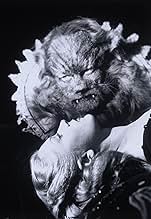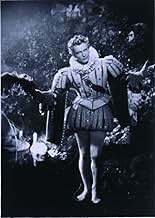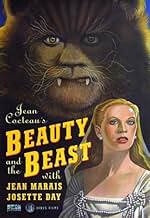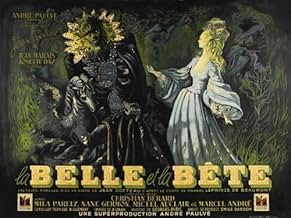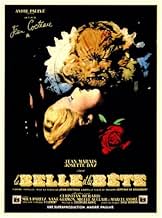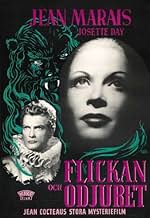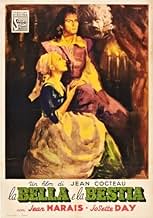Una bella giovane donna prende il posto di suo padre come prigioniero di una bestia misteriosa.Una bella giovane donna prende il posto di suo padre come prigioniero di una bestia misteriosa.Una bella giovane donna prende il posto di suo padre come prigioniero di una bestia misteriosa.
- Regia
- Sceneggiatura
- Star
- Premi
- 1 vittoria e 2 candidature totali
- Merchant
- (scene tagliate)
- (solo nei titoli)
- La Belle (1995 opera version)
- (voce (canto))
- The Father
- (voce (canto))
- …
- Félicie (1995 opera version)
- (voce (canto))
- Adélaïde (1995 opera version)
- (voce (canto))
- La Bête
- (voce (canto))
- …
- Ludovic (1995 opera version)
- (voce (canto))
- Voice of Magic
- (voce)
- (non citato nei titoli originali)
- Footman
- (non citato nei titoli originali)
- Footman
- (non citato nei titoli originali)
Recensioni in evidenza
Cocteau's attempt to socialize his female viewers and alleviate their fear of sex is clear through textual analysis. The mirror that Beauty peers into her first night at the castle shows a reflection of her father where her own self-reflection should have been, indicating that she is still very much defined by the dominant male role in her life. Almost immediately after, the bed sheets slide off the bed in a provocative manner, portending future threat, and she runs away repulsed. She confronts the Beast, and promptly faints. This scene establishes her fear and immaturity; however, Beauty and the Beast become progressively closer through the film, holding hands and talking. During her visit to her family, he caresses and wraps himself in her blanket, another reference to his association with her bed. When she decides she has remained at home too long, she lies on her bed and looks at the beast in the mirror's reflection. This is the point of transition, where she links this new dominant male figure to her bed. Instead of being repulsed by his reflection, she lovingly caresses the mirror and returns to him. In order to do this she slips on his glove, perhaps a reference to condoms. His glove is a perfect fit, displaying their perfect compatibility.
The Cocteau version of Beauty and the Beast also addresses the dual nature of masculinity where good and evil coexisted, and the lines of differentiation are increasingly blurred. He emphasizes his statement that man and beast are indistinguishable by casting Jean Marais in both roles. Beauty comments upon this, when she tells the prince that he reminds her of a friend of her brother's. The fine distinction between the two characters is the prince's inner beauty as well as outer. When the brother's friend becomes greedy, he transforms into a beast so his inner ugliness and outer appearance coincide.
Socialization of Beauty remains central despite two forms of masculinity because the two never meet, so Beauty's choice between the two is central. The film is about the distinctions between men, and the importance of picking the right one. Since both the friend and the prince have the same attractive male face, the lesson is to hold out for the true prince who is good and noble on the inside as well as attractive.
As the Beast-turned-prince reclaims himself at the end of Cocteau's film, the message the audience should take away is that love can cure any ugliness and make any beast a man. The interchangeability is evident and the choice important. Beauty loves the Beast, overcoming her fear of the beastly in marriage and claiming she will get used to him, the reality of a man. Beauty makes a gradual transition from love of her father to a husband, as portrayed in her mirrors depicting her core identity.
"Beauty and the Beast" not only beautifully re-tells a beautiful story, but powerfully displays the Beast's magic. Cocteau's genius is that he makes simple editing techniques look like art and in this movie like the combination of art and magic. Watch what happens when Beauty gives one of her sisters a present from the Beast's castle which the Beast meant only for Beauty.
The version I saw was in French with English subtitles, but the visuals, in glorious black and white, are so stunning, you could almost cover up the subtitles and still understand what's going on.
I can't recommend this movie enough! It is #1 on my foreign film list.
Most people will know this classic story as the Disney animated film from the early 1990's. That one wasn't bad for Disney, but I think most will agree that this largely ignored version is a far superior telling of the tale. The Beauty and the Beast works because underneath it's fairytale setting; it's a tender love story. It's a story of how love can transcend superficial boundaries. The Beast is, obviously an ugly character on the outside, albeit one with a heart of gold on the inside, thus allowing Belle to fall in love with him and the audience to feel for the character in spite of his physical affliction. This story has become legend, in both cinema and literature and several stories have taken influence from it since - from soft-core bestiality porn flick, 'The Beast', to the classic 'King Kong'; The Beauty and the Beast is one of the most important stories ever written, and Jean Cocteau has more than done it justice with this film.
This is my first taste of Jean Cocteau. I've heard many a good thing about the man (including that he inspired the majestic 'Eyes Without a Face'), and judging by this film alone; they would appear to be true. The way that Cocteau creates the atmosphere in the movie is superb, and also very subtle. There's no real macabre imagery on display, and Cocteau relies on smoke and the lavish Gothic settings to do it for him. It's true that the beast itself looks a little rubbish; but it still looks a damn sight better than a lot of the CGI incarnations that we see all too much of today. If what I've heard is right; Cocteau is responsible for much of what cinema has come to rely on, but even if it isn't true; this film is a must see.
So much for watching it through a child's eyes and accepting the fantasy at face value! At the beginning Cocteau states "Once upon a time...", but really for discerning adult cineastes (and/or poets) to drop their guards and enjoy it for what it was - a magical filmic fantasy. It's uniformly marvellous in all departments, direction, photography, acting, music, design, and Cocteau trotted out all his favourite cinematic tricks - just part of the sequence between Blood of a Poet in '30 and Testament of Orphee in '61. The script was suitably steeped in non sequiteurs and puzzles to add to the heaviness of it all. Er, not that it matters but what happened to Ludovic?
The wonderful dark brooding smoky atmosphere is the most important aspect though - there are few films I've seen with such a powerful cinematic atmosphere, Reinhardt's Midsummer Night's Dream is one and Dead of Night another etc. But the romantic melancholic atmosphere here was something ... incredible. It was only possible with black and white nitrate film stock to capture such gleaming, glistening and time- and place-evoking moving images - it hasn't been quite the same since 1950 with safety film in use.
If you're an adult about to give it your first (let yourself) go, I envy thee! All in all a lovely inconsequential fantasy, make what erudite and informative allegorical allusions you will.
The tale is one of awakening, of desires, and of strange surroundings. Living statues and disembodied arms holding candles aloft populate the twilight world of the Beast's castle, where the fate of a young girl turns on the plucking of a rose. Ghostly voices, choral and otherwise, shadows and softness accompany Beauty as she walks into the kingdom which first repels and then entrances her.
I have to agree with the view that the great Greta Garbo took of this movie, though: give me back my Beast'. The transformation from powerful feline seducer to run-of-the-mill Prince is a disappointment. It is during the scenes where Beauty and the Beast play out their fantasy that this film has its most potency.
Lo sapevi?
- QuizThe effect of the candles lighting themselves as the merchant passes them was achieved by blowing them out and then running the film in reverse as he walked backward past them. The entire sequence was done in one long take and reversed - a quick glimpse of the fireplace shows the flames appearing to move downward.
- BlooperAs Belle and The Beast walk in the garden, a comparatively modernly dressed boy in short pants is visible for a few seconds to the top right behind them.
- Citazioni
Opening Title: Children believe what we tell them. They have complete faith in us. They believe that a rose plucked from a garden can plunge a family into conflict. They believe that the hands of a human beast will smoke when he slays a victim, and that this will cause the beast shame when a young maiden takes up residence in his home. They believe a thousand other simple things. I ask of you a little of this childlike simplicity, and, to bring us luck, let me speak four truly magic words, childhood's "Open Sesame": "Once upon a time..." Jean Cocteau
- Curiosità sui creditiThe title and some of the opening credits are written with chalk on a blackboard, and then erased.
- Versioni alternativeThe 1946 American release of the film had an entirely different set of opening credits, and is the one available on VHS. In that release, these credits were presented straightforwardly, with nothing unusual about them, and with the title in English. In the film's original release, available on DVD, the credits were written on a blackboard, in what is known as cursive handwriting, the same type of writing in which the opening prologue appears. After every credit, Jean Cocteau's hand would erase it and write the next credit with what appeared to be chalk. Then, after the credits ended, a film clapboard was seen, it was slammed together, as they always are just before a film director yells "Action!", and then the film's written prologue was seen.
- ConnessioniEdited into Histoire(s) du cinéma: Fatale beauté (1994)
- Colonne sonoreLa belle et la bête
an opera by Philip Glass
(Not part of the original soundtrack, and not heard in the film's first two releases)
© 1995 Nonesuch Records for the US and WEA International Inc. for the world outside of the United States
I più visti
Dettagli
Botteghino
- Lordo Stati Uniti e Canada
- 298.718 USD
- Fine settimana di apertura Stati Uniti e Canada
- 3708 USD
- 23 giu 2002
- Lordo in tutto il mondo
- 298.718 USD
- Tempo di esecuzione1 ora 36 minuti
- Colore
- Mix di suoni
- Proporzioni
- 1.37 : 1



